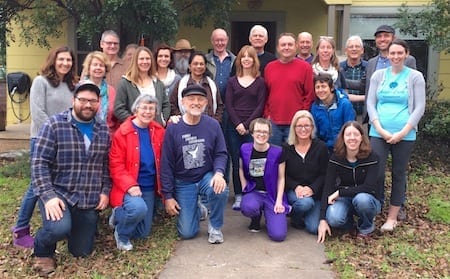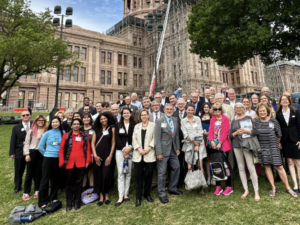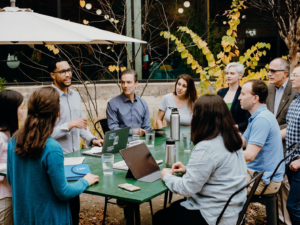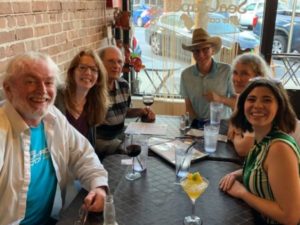
Since this photo of Austin CCL volunteers was taken in January 2017, the Austin area has grown from one chapter to five.
New Austin chapters empower more CCLers to lead
By Mary Gable
The first CCL chapter in Austin, Texas began the way most chapters do: with one person ready to do something about climate change. The year was 2012, and Austin resident Anna Graybeal decided that she was tired of feeling hopeless. She participated in the CCL intro call and before long, Anna had persuaded neighbor Susan Adams to help her lead the city’s first chapter meeting.
Together, they built a thriving chapter with a core of highly active members. The story might have ended there if it weren’t for an exercise at the 3rd Coast Regional Conference held in February. The Austin metro area spans six congressional districts, and Anna suggested that attendees seat themselves according to their local representatives.
Once they did so, the members realized that they might have enough people to form an independent group for each district. Anna proposed the idea and asked people to volunteer to serve as leaders. People rose to the request, and just like that, Austin went from having one CCL chapter to having five. “It happened really organically, and at just the right time,” Anna said.
Engaging members new and old
The positive momentum generated at the February meeting has carried the new chapters through a busy 2017. The most important outcome of the split, members say, is that there are now more ways for more people to pitch in. Teresa Melomo joined CCL late in 2017 and leads the new Barton Springs chapter. She organized a fundraiser to cover the group’s expenses and planned tabling events at markets and festivals deep in her district. Another new member represented his chapter at Congressional Education Day in November.
Ben Boral and Paige Caras, two other new CCLers, volunteered to help coordinate efforts across all Austin chapters. A shared Google doc contains contact and meeting information for each chapter, as well as updates on progress for each lever of political will. This allows members to pool information and resources—for example, sharing one’s connection with a grasstops leader in a neighboring district. It’s also a place for newer members to learn what’s happening in nearby chapters and find opportunities to get involved.
Discovering what works
At the same time, the fledgling chapters are dealing with the challenges of striking out on their own. A smaller gathering can occasionally dampen the energy at monthly meetings, and leaders are still learning the best ways to empower their groups. Most of all, members miss seeing their friends from other districts. The chapters united in October for a joint monthly meeting followed by a group outing. The event was well-attended, and the leaders plan to organize periodic joint events in the future.
Despite the growing pains, CCL leaders in Austin agree that the split has been positive, and encourage chapters in other cities considering something similar to take the plunge. What will help them succeed? “Keep lines of communication open between the various groups in your city,” Paige said.
“Empower group members with specific tasks and support them along the way. Be patient and understand that people’s ability to contribute will ebb and flow. Leverage tools and processes that others in CCL have used successfully.” The Austin chapters have also offered to share their master Google doc with others who are interested in using or modifying it for their purposes. To request access, email Page at paigecarasaustin (at) gmail (dot) com.
“What I love most about CCL is being around people who care as much as I do about fixing climate change,” said Anna. “But it’s exhausting work. That’s why we need to get more people engaged in ways that they enjoy and are meaningful for them. We all need each other’s support to keep up this fight.”





